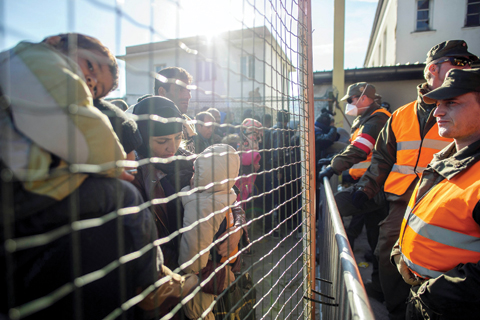 SENTILJ: Refugees and migrants wait to cross the Slovenian-Austrian border from the Slovenian city of Sentilj, yesterday. — AFP
SENTILJ: Refugees and migrants wait to cross the Slovenian-Austrian border from the Slovenian city of Sentilj, yesterday. — AFPBERLIN: Germany is "not an easy country", Vice Chancellor Sigmar Gabriel yesterday warned refugees who have flocked to the EU's top economy, reiterating Berlin's pledge to welcome and integrate them. Gabriel, who is also economy minister, was speaking of challenges and opportunities as Europe's most populous country this year expects to take in between 800,000 and one million asylum seekers.
"Germany is not just any country, and not an easy country," he told a business forum in Berlin. "You don't become a world export champion without a relatively demanding work culture."
He said that while "everything you need to know" about German society and values "is summarized in the first 20 articles of our constitution, one does not become a constitutional expert just by crossing the border." He called on Germans of foreign origin, heirs of previous waves of immigration, to act as intermediaries and explain the country to newcomers. Germany, where about one fifth of the population is of foreign origin, took in many immigrant workers in the 60s and 70s, and citizens of the former Yugoslavia and Soviet Union in the 1990s.
Gabriel said the newcomers could fill gaps in the German labor market as the population is set to shrink and the pension burden will grow amid a very low birth rate and high life expectancy.
On the migrant wave, he said that "we aren't taking them in because we want to solve the demographic problem, but because they're fleeing war, civil war and repression".
"But, given that they're here, we would be crazy if we didn't try to make them the professionals of tomorrow. That's something we have to get better at. He added that "we are a country that can't deal well with chaos. We like order and have a regulation for everything-except for one million refugees in a single year."
Ever-closer EU
Britons do not want to be part of Europe's "ever-closer" union, British finance minister George Osborne said yesterday, arguing that the EU must protect the rights of non-euro members.
And as Britain heads towards a referendum on membership in the EU, due by late 2017, Osborne said taxpayers in non-euro countries must not be asked to bail out stricken euro-zone members.
"We must never let taxpayers in countries that are not in the euro bear the cost of supporting countries in the euro-zone," he said, months after EU and IMF lenders again bailed out debt-stricken Greece.
And participation in further European integration efforts, such as the banking union which is being formed, must remain "voluntary", he said.
Britain's chancellor of the exchequer was speaking at a Berlin meeting of the Federation of German Industry which was also attended by Chancellor Angela Merkel and Economy Minister Sigmar Gabriel, a day after meeting his counterpart Wolfgang Schaeuble. He said London wants EU treaty change to safeguard the rights of non-euro-zone countries, to protect its taxpayers and its crucial financial sector.
This would include "the recognition that the EU has more than one currency and we should not discriminate against any business on the basis of the currency of the country in which they reside", he said. In return, London would not seek to block euro members as they seek closer economic and financial integration.
"Quite frankly, the British people do not want to be part of an ever closer union," Osborne said.
'British have to decide'
Merkel reiterated her view that "the UK should remain an EU member" and pledged Germany would help "wherever we can" to prevent a "Brexit", while recognizing that "the British have to decide" on the issue alone. British Prime Minister David Cameron has promised to hold a referendum on EU membership before the end of 2017 and has said he will campaign to stay if he can obtain reforms that would loosen Britain's ties with the rest of the EU.
Cameron, who has not ruled out supporting a "Brexit", is expected to publish a list of British demands this month. Osborne said: "We want Britain to remain in a reformed European Union, but it needs to be a European Union that works better for all the citizens of Europe-and works better for Britain too".
He added that Britain does not want to be burdened with excessive EU regulation, saying: "We need to pick up the pace, make Europe more competitive, make us the home of jobs and innovation."
"If the EU allows itself to be priced out of the world economy, the next generation will not get jobs, living standards will decline and the Union will lose the popular consent of the people of Europe," Osborne said. Osborne stressed that in Britain ever closer integration "is now supported by a tiny minority of voters". "I believe it is this that is the cause of some of the strains between Britain and our European partners. Ever closer union is not right for us any longer." - AFP










